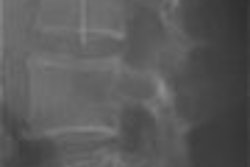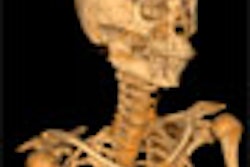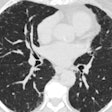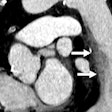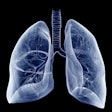SAN DIEGO - A whole-body colorectal cancer staging algorithm that includes PET/CT can improve accuracy while shortening the time to treatment, according to a presentation this week at the Society of Nuclear Medicine (SNM) meeting.
"Colorectal cancer staging requires a multistep, multimodality approach," said Dr. Patrick Veit from University Hospital of Essen in Germany. "Complete TNM staging in one step is desirable."
In his SNM talk, Veit updated his group's earlier study, which found that integrated whole-body PET/CT can efficiently stage colorectal cancer, especially in patients with incomplete colonoscopy (Gut, January 2006, Vol. 55:1, pp. 68-73).
The aim of the current study was to implement a PET/CT colonography and colonoscopy regimen in clinical practice, Veit said. The patient population consisted of 52 patients who underwent whole-body PET/CT one day after conventional workup (abdominal CT, thoracic CT, and optical colonoscopy).
For PET/CT, imaging of the thorax was done with the patient in the supine position. Bowel relaxation and water enema was performed with the patient in the prone position for the abdominal scan, Veit said.
The potential impact on patient management was assessed. The standard of reference was composed of postsurgical histopathology, optical colonoscopy, and a 310-day follow-up.
According to the results, the T stage was more accurately defined with PET/CT colonography and was significantly more accurate than colonography alone (p < 0.05).
In 74% of all cases, PET/CT achieved correct staging versus 52% for conventional imaging. No significant difference was found between the two methods for N- or M-stage cancers, the group reported.
This "all-in-one" staging method impacted therapy decisions in 10% (five of 52) of the patients, Veit reported. It also changed the method of therapy in four patients, he said.
This PET/CT algorithm can be implemented into daily practice as a routine staging tool in conjunction with colonoscopy, but it is not a replacement for the latter, Veit concluded.
Session moderator Dr. Antonia Dimtrakopoulous-Strauss asked if lymph node involvement was detected with the PET/CT exam, which resulted in the treatment change in four patients. Veit said that lymph node involvement would not change management as radical resection of the tumor and lymph nodes would still be required. Instead, the PET/CT exam offered new information on anastomosis recurrence and distant metastases that may have benefited from neoadjuvant therapy, he explained.
An SNM session attendee asked why the group chose water enema over air and why they did not perform colon distension. Veit said that distension would have prolonged the exam time. He also said that water enema was better than air for T staging as there tended to be fewer artifacts from patient movement and better differentiation of the colonic wall.
By Shalmali Pal
AuntMinnie.com staff writer
June 6, 2006
Related Reading
PET/CT is powerful for radiation therapy planning, May 4, 2006
Whole-body PET/CT efficiently stages colorectal cancer, January 3, 2006
Copyright © 2006 AuntMinnie.com




